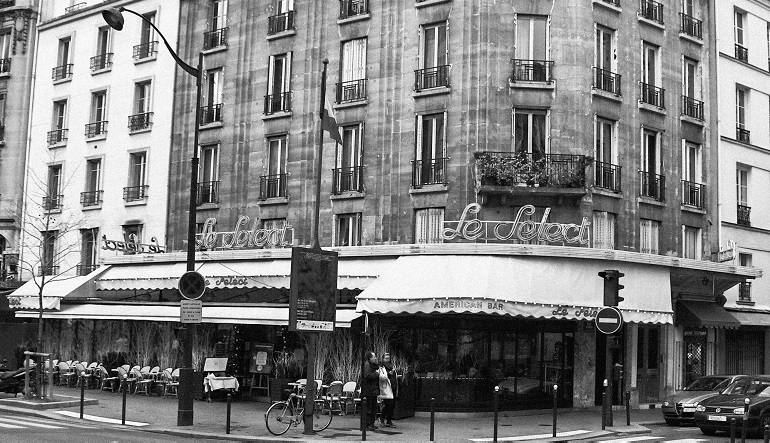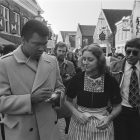MFA vs. Saint Germain des Près

Over the past five years, France has witnessed, bemused, the emergence of a very special breed of master’s programs—in creative writing. Today, in a country that’s supposedly one of the cradles of Western literature (or so we French love to believe), there are, all in all, three such programs.
Funnily enough, only one of these is in Paris, hosted by the University of Paris 8 (Saint-Denis). The others are in Le Havre and Toulouse. Writing workshops do exist elsewhere—in schools, universities, community centers—but they aren’t integrated within a logic of teaching the ins and outs of the writing life. The proportion of actual grad school-level programs remain surprisingly low, especially considering how inexpensive it is to enroll if you’ve been accepted, and the sheer number of people applying for these programs (it’s said that France is a country of frustrated writers). It’s hard to pinpoint why, exactly, without falling headfirst into clichés.
There’s obviously the enduring resistance against the idea that writing can be taught. This is nothing new, and it’s rooted in the construction of the writer as one driven by natural talent, intuition, divine inspiration, what have you. France, however, is the country of the philosopher who famously wrote that one wasn’t born a woman, but became one. Can’t the same thing be said of the writer? But a few centuries of literary heavyweights, enshrined in the national imagination as “The Greats,” still have us believe that writers are not of our ilk, that their essence is substantially different from ours. Can you imagine Victor Hugo or Baudelaire trying to earn an MFA? Preposterous.
It’s not entirely a bad thing that some form of sanctity should still be attached to writing. There’s the very real fear that creative writing programs may just homogenize everyone, that writing, and the arts in general, may be the last haven in a society that valorizes productivity and usefulness above everything else, and that, for this reason, writing and literature should obey their own logic, not be subjected to the mercantile logic of society. Yet we do have art schools aplenty that teach not only art history and the apparatus of the art world—the curating, the selling, the buying—but also the very craft of it. Replace pigments with words—is it so far-fetched to think one can teach the techniques of writing, rather than the imagination that drives it? (Though I’d argue that imagination is also a tool, and can be trained to be either expansive and empathetic, or restricted and narrow.)
Even when we acquiesce that what the writer does is basically a craft, there’s still the lingering idea that, contrary to pottery or opera singing, you can’t separate the technical virtuosity from individual talent and genius. In a nutshell: if you’re inherently a good writer, you’ll have to work at and refine your technique, but it will still naturally come to you.
There’s also the fact that the realm of the French university, and French academia in general, is heavily associated with knowledge and analysis. Within the walls of these hallowed institutions, you write papers and reports and theses, not poems. (If you write poems, then you’re scribbling them in the margins of your class notes because you’re bored. No one is actually telling you to write a poem, save for that very quirky literature professor.) The traditional structure of universities allows little space for anything attached to creativity—though that’s beginning to change. No one can deny either the whiff of anti-American sentiment in this distrust of creative writing programs. Just as with gender studies, or anything that doesn’t feel as rigorous and academic as the disciplines we’re used to here, creative writing programs are implicitly seen as a waste of time and resources, at best a dubious import from overseas.
Many French writers, intellectuals, and literature enthusiasts are aware of the limitations of such views. Plenty of authors are getting involved in such programs as permanent or invited lecturers, or in writing workshops in general. And across the nation, structures analog to the ones in the US—spoken word groups, writing clubs—are springing up. There’s a high demand, for sure. The thing is, while it’s true that France’s disdain for the very idea of teaching creative writing arises mostly out of snobbery, national history does play a role in there. Much has been written about the role of US creative writing workshops and programs in the Cold War era: the rise of creative writing as an academic path is concomitant with certain geopolitical developments, and this is no coincidence. But this history is hardly relevant in the French context: at the heyday of the French empire, French culture and identity were promoted and showcased in different ways. Even before this, the country had a long tradition of salons, gatherings, and mentorships (and writerly nepotism) that all functioned like an MFA redux. The divergences in the history of universities and of the publishing industry in the two countries also play a role.
In this sense, it seems that the French culture of writing is closer to that of NYC, as described in the essay collection MFA vs. NYC. But even that is not entirely accurate. New York’s mythos is that of a city driven by materialism, financial success, a quest for fame—even in the insulated writing world. The French writing world, often assimilated to Left Bank Paris, still lingers in the mythology of a bohemian scene—Saint Germain des Près, the Quartier Latin, etc.—where getting a job at the Gallimard publishing house while writing on the side is a Romantic kind of affair.
And that’s perhaps what it boils down to: the romance of the writer who writes outside of any institution, who exists outside of a certain social and material context, and which French universities just can’t leave behind. Didn’t we invent the image of the tortured poet, after all? How could an MFA ever teach that?



